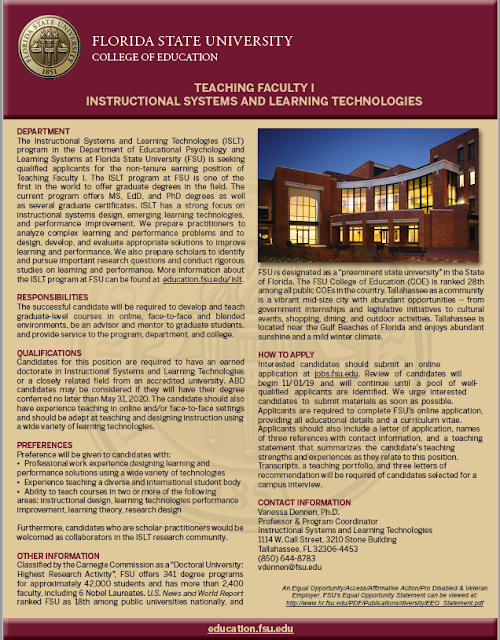2019 AECT ISLT Presenters
Instructional Systems and Learning Technologies (ISLT)
The annual Association for Educational Communications and Technology (AECT) Convention will be held this year in Las Vegas, Nevada from October 21, 2019 - October 25, 2019. Florida State Universities (FSU) Instructional Systems and Learning Technologies program, housed inside the College of Education (COE), will be represented by several students, faculty, and alumni. Sessions delivered by FSU will consist of presentations, emerging technology showcase, poster sessions, and design and development showcase, roundtables, and panel discussions as seen below.
PRESENTATIONS
A Case Study of Peer
Assessment of an Ill-Structured Group Task in an Information Technology Course
- Jiyae Bong & Min Sook Park
ADDIE-ing the Systems
Approach to Improve Instruction for 6000 University Students – Jeffrey Phillips,
James Klein, Elizabeth Dunne & Mike Siriwardena
Forgetting “Book” and
Designing for Open: An OER Design Case - Vanessa Dennen &
Lauren Bagdy
The Trends in IDT Database:
A Means of Enhancing Your Professional Practice - T. Logan Arrington,
Alison Moore, Fabrizio Fornara, Weinan Zhao & Robert Reiser
Effectiveness of
Learning Support Format for Math Problem Representation – Sungwoong Lee &
Fengfeng Ke
Visual Design
Principles in Multimedia Learning - renata kuba kamikabeya &
Allan Jeong
Moving from Gameplay
to Learning: Exploring Learners’ Problem-Solving Behavior, in-game Performance
and Transfer of Learning in a Digital Game-based Learning Environment – Zhichun
Liu
[NR]A study of K-12
teachers’ online learning experiences: A literature review of structured and
open online professional development – Yujin Park
Building Personal
Learning Network (PLN) through Twitter: An Activity System Analysis of Twitter
Conference Backchannel – Hajeen Choi
Exploring the
Qualifications of New Faculty in Instructional Design and Technology - T.
Logan Arrington, Lauren Bagdy & James Klein
How Do You Do, Fellow
Kids? "New Teachers" in Twitter #ntchat - K. Bret Staudt
Willet & Lauren Bagdy
Social Media and Undergraduates:
Use and Opportunities Across Student Life - Vanessa Dennen,
Lauren Bagdy, Hajeen Choi, Demetrius Rice
& Ginny L. Smith
What are they talking
at digital conference backchannel? From building PLN to establishing online
presence: use of membership categorization and positioning theory as analytic
frameworks – Hajeen Choi
Provocations to
Envision the Future of the Educational Technology Field – Enilda Romero-Hall,
Tugce Aldemir, Patricia Young, Xun Ge, Vanessa Dennen, Thomas C. Reeves &
George Veletsianos
Faculty-librarian
Partnerships for Adopting and Developing OERs: a Multiple-case Study - Zhongrui Yao
& Vanessa Dennen
Building PLNs for
Preservice Teachers: Perceptions and Future Tool Intentions - Vanessa Dennen,
Lauren Bagdy & Yujin Park
EMERGING TECHNOLOGY SHOWCASE
T04-Designing
Function Fighters: A digital game-based learning experience for algebraic thinking
– Ginny L. Smith
T08-How gender
moderates participants’ behavior in 3D teaching-focused VLE: case study of STEM
GTAs - Mariya Pachman, Fengfeng Ke, Zhaihuan Dai
& Xin Yuan
POSTER SESSIONS AND D&D SHOWCASE
T38-Online Reciprocal
Teaching: Designing an Instructional Approach that Scaffolds Metacognitive
Strategy Use for College Students - Jiyae Bong & Vanessa Dennen
T55-What Makes a
Learning Game Effective?: A Literature Review of Game Design Elements - Chih-Pu Dai
T82-Learning
Ecosystems: A Framework for Systems Thinking – Anita Mitchell
T97-Examining
Technology Integration in Burkina Faso: Inspiration of Taiwanese L2 Chinese
Teachers’ Beliefs and Practices - Chih-Pu Dai
T99-Does My Teacher
Smile? An Exploration of Social Presence and Identity in Online Environments - Ömer Arslan
The Pursuit of STEM
Education: 5 Considerations for Design and Implementation. – Demetrius Rice,
James Klein & Ginny L. Smith
ROUNDTABLES
T42-Five Success
Factors for Effective Mobile Performance Support Systems – Yao Huang &
James Klein
T59-Exploring the
Effect of Group-Collaboration Design on Developing Preservice Teachers’
Technology-Integration Skills through Scientific-Inquiry Experiences. – Jewoong
Moon, Sungwoong Lee & Xinhao Xu
T46-Inspiring
Newcomers with Onboarding Best Practices: A Literature Review – Kari Diane
Knisely
PANEL DISCUSSION









































